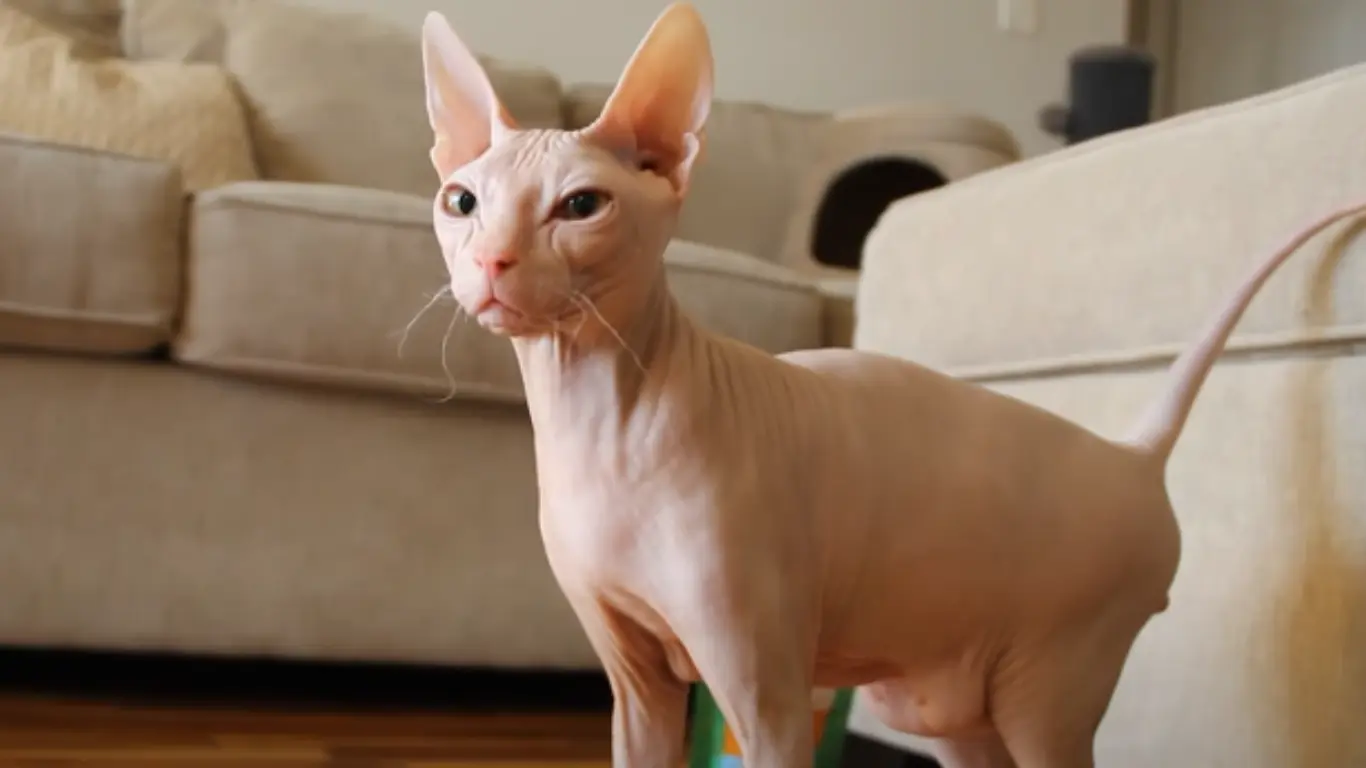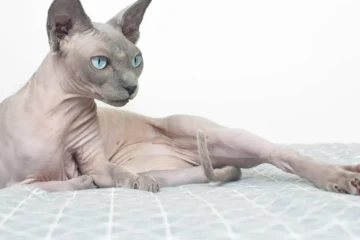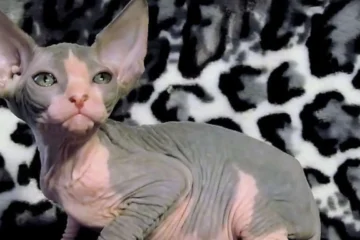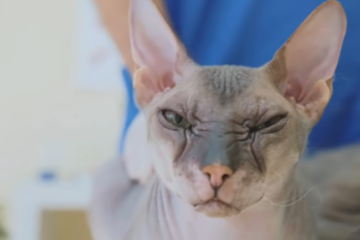Sphynx cats, with their distinctive hairless appearance, are one of the most unique and recognizable cat breeds in the world. But along with their intriguing looks comes a host of myths and misconceptions that can mislead potential cat owners. From claims that they are hypoallergenic to the belief that they are high-maintenance pets, many myths surround these captivating felines. If you’re considering adding a Sphynx cat to your family or are simply curious about this breed, it’s essential to separate fact from fiction. In this article, we’ll debunk 10 of the most common myths about Sphynx cats and reveal the truth about what it’s really like to live with one.
Myth 1: Sphynx Cats Are Completely Hairless
One of the most persistent myths about Sphynx cats is that they are completely hairless. While it’s true that they lack a traditional fur coat, Sphynx cats are not entirely bald. Instead, they have a fine layer of fuzz that covers their skin, giving them a soft, suede-like feel. This peach-fuzz coating varies in thickness and may be more noticeable in some cats than others.
The Truth About Sphynx Cat’s Skin
The fine layer of fuzz on a Sphynx cat serves an important role in protecting their skin. Unlike furred cats, the skin of a Sphynx cat is more exposed to the elements, making it more prone to dryness, oil buildup, and even sunburn. The lack of fur also means that their skin produces more oils, which can lead to a greasy feel if not properly cared for.
How to Care for a Sphynx Cat’s Skin
To maintain a Sphynx cat’s skin health, regular grooming is essential. This includes weekly baths to remove excess oils and keep their skin clean. Use a gentle, hypoallergenic shampoo to avoid irritation. Additionally, moisturizing their skin with a cat-safe lotion can help prevent dryness. Regular cleaning of their ears and trimming of their nails are also crucial aspects of their grooming routine.
Myth 2: Sphynx Cats Are Hypoallergenic
Another common belief is that Sphynx cats are hypoallergenic, making them an ideal choice for allergy sufferers. However, this is not entirely accurate. While Sphynx cats may produce less dander compared to furred cats, they are not truly hypoallergenic.
Understanding Allergens and Sphynx Cats
Cat allergies are primarily caused by a protein called Fel d 1, which is found in cat saliva, skin cells (dander), and urine. Because Sphynx cats groom themselves like any other cat, they still produce and spread this protein throughout their environment. However, the absence of fur means there’s less dander, which might reduce the severity of allergic reactions in some individuals, but not eliminate them completely.
Managing Allergies with a Sphynx Cat
If you or a family member has allergies but are determined to own a Sphynx cat, there are ways to manage the situation. Frequent cleaning of your home, including vacuuming with a HEPA filter, can help reduce allergens. Regular bathing of your Sphynx will also help minimize dander on their skin. Lastly, using air purifiers and creating allergen-free zones in your home can further reduce exposure.
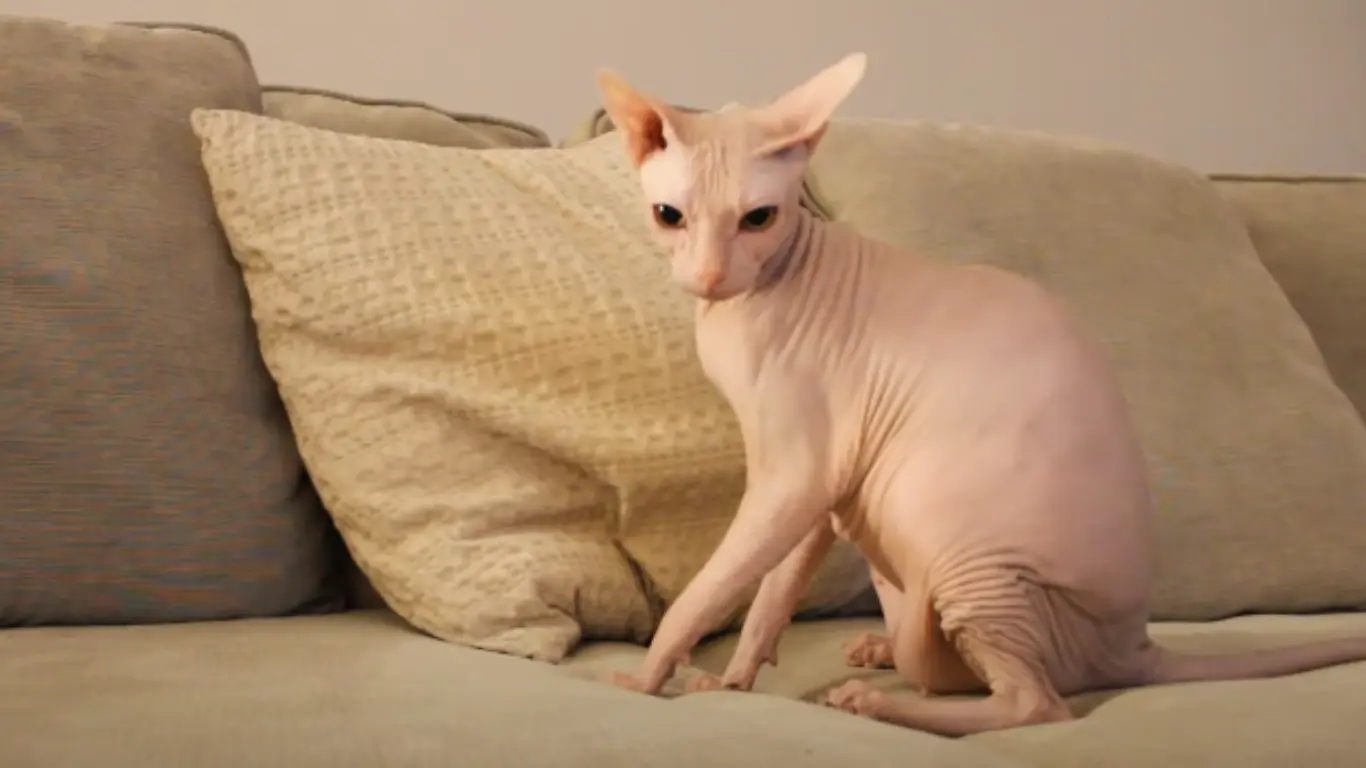
Myth 3: Sphynx Cats Are Unhealthy
Some people believe that Sphynx cats are inherently unhealthy due to their lack of fur and distinct appearance. While it’s true that Sphynx cats are prone to certain health issues, they are not inherently less healthy than other cat breeds.
Health Issues Specific to Sphynx Cats
Sphynx cats can be susceptible to specific health problems, such as hypertrophic cardiomyopathy (HCM), a common heart condition in cats that causes the heart muscle to thicken. They may also experience dental issues, skin conditions like fungal infections, and obesity if not properly managed.
How to Ensure a Healthy Life for Your Sphynx
To keep your Sphynx cat healthy, regular veterinary check-ups are crucial, especially for monitoring heart health. A balanced diet rich in nutrients will support their overall well-being, and daily exercise is essential to prevent obesity. Regular grooming and skincare will help manage any skin issues, and maintaining dental hygiene through regular teeth brushing can prevent dental disease.
Myth 4: Sphynx Cats Are High Maintenance
The perception that Sphynx cats are high-maintenance pets can discourage potential owners. While they do require more grooming than some other breeds, this doesn’t necessarily make them difficult to care for.
Grooming Needs of Sphynx Cats
Sphynx cats do require regular grooming to maintain their health and hygiene. Their lack of fur means they can accumulate oils on their skin, leading to a greasy feel. Weekly baths are necessary to remove these oils and prevent skin problems. Their ears can also accumulate wax more quickly than those of furred cats, so regular ear cleaning is a must. Additionally, their nails need to be trimmed regularly, as they lack fur to wear them down naturally.
Tips for Easy Maintenance
To make grooming your Sphynx cat easier, establish a routine from an early age. Use cat-safe grooming products, and consider getting your cat accustomed to bath time by making it a positive experience with treats and praise. Invest in grooming wipes for quick clean-ups between baths and keep their living environment clean to reduce the need for frequent baths.
Myth 5: Sphynx Cats Are Always Cold
Given their lack of fur, it’s a common assumption that Sphynx cats are always cold and require constant warmth. While they do seek out warm spots, this myth oversimplifies their ability to regulate their body temperature.
How Sphynx Cats Regulate Their Temperature
Sphynx cats have a slightly higher body temperature than other cats, which helps them stay warm despite their lack of fur. However, they do enjoy warmth and will often be found basking in the sun, snuggling under blankets, or curling up on warm surfaces like radiators or heated beds.
Keeping Your Sphynx Cat Comfortable
To keep your Sphynx cat comfortable, provide them with plenty of warm spots in your home, such as blankets, heated beds, and even cat-safe clothing during colder months. Ensure they have access to a variety of temperature zones so they can move between warm and cooler areas as needed.
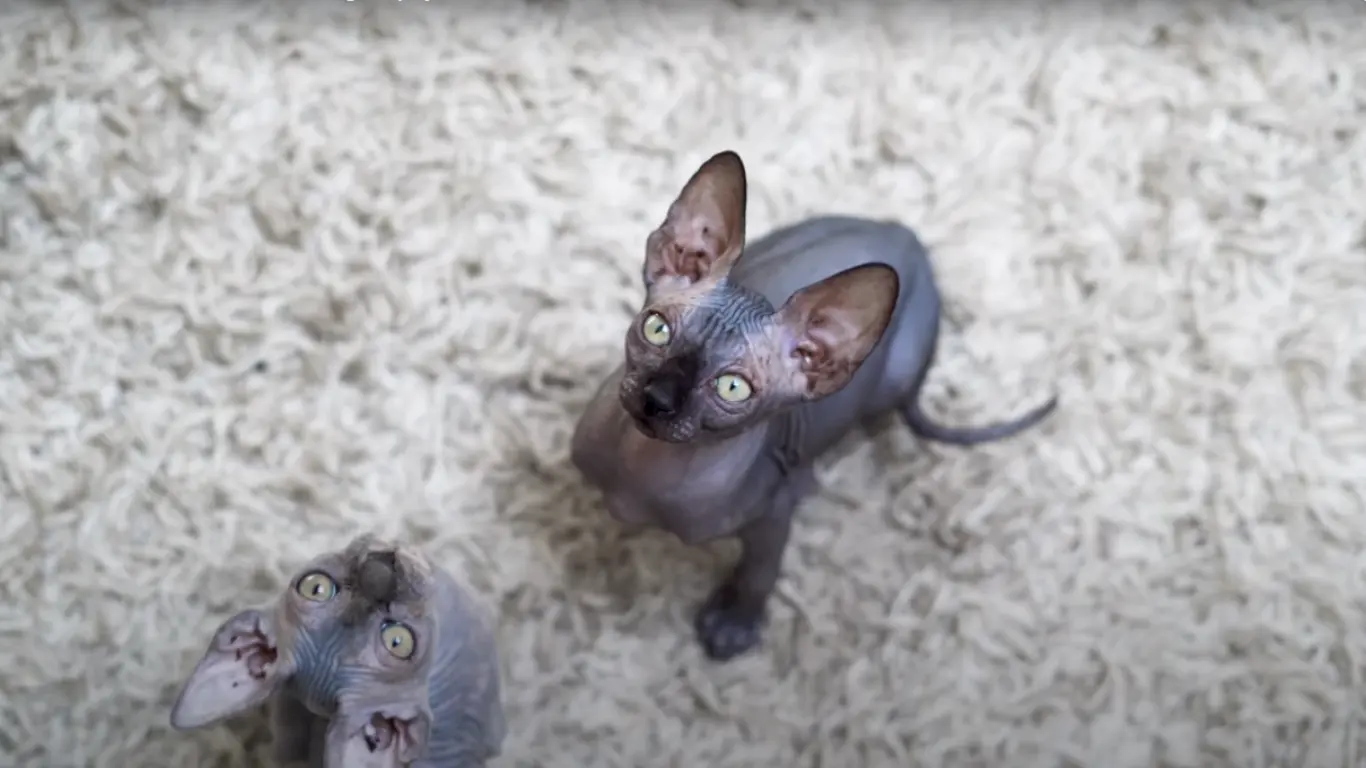
Myth 6: Sphynx Cats Are Unfriendly and Aloof
Another myth is that Sphynx cats are unfriendly and aloof, perhaps due to their somewhat unusual appearance. In reality, Sphynx cats are known for their affectionate and social nature. If you’d like to dive deeper into their behavior and quirks, check out Guide on Sphynx Cat Personality for a more detailed understanding of their unique traits.
The Social Nature of Sphynx Cats
Sphynx cats are incredibly social and enjoy the company of their human companions. They are known for their playful, curious, and affectionate behavior. They often form strong bonds with their owners and can be quite vocal in seeking attention and interaction.
How to Build a Strong Bond with Your Sphynx
To build a strong bond with your Sphynx cat, spend quality time with them through play, grooming, and simply sitting together. Sphynx cats enjoy interactive play sessions and mental stimulation, so invest in toys and activities that engage them. They also appreciate physical affection and will often snuggle up to their owners, so don’t be shy about giving them the attention they crave.
Myth 7: Sphynx Cats Are a New Breed
Some people believe that Sphynx cats are a new or artificially created breed, but their history goes back much further than most realize.
The History of the Sphynx Cat
The Sphynx cat breed began in the 1960s when a hairless kitten named Prune was born in Canada. This natural mutation was then selectively bred to create the Sphynx breed as we know it today. While the breed is relatively young compared to others, it is not artificially created but rather the result of a natural genetic mutation.
Understanding Their Ancestry
Sphynx cats descend from a line of naturally occurring hairless cats, and their development as a breed involved careful breeding practices to ensure their health and distinct characteristics. Their genetic makeup is closely monitored by breeders to avoid health issues and maintain the integrity of the breed.
Myth 8: Sphynx Cats Are Not Good with Other Pets
There’s a misconception that Sphynx cats do not get along well with other pets, which can deter potential owners who already have animals at home.
Sphynx Cats and Socialization
Sphynx cats are generally very social and adaptable, making them good companions for other pets. They are known to get along well with other cats and even dogs, especially if introduced properly. Their playful and affectionate nature often makes them the life of the party in a multi-pet household.
Tips for Introducing a Sphynx to Other Pets
To ensure a smooth introduction between your Sphynx cat and existing pets, start by allowing them to get used to each other’s scent. Gradually introduce them in a controlled environment and supervise their interactions. Patience is key, as it may take some time for all pets to adjust to each other. Positive reinforcement, such as treats and praise, can help create a harmonious relationship.
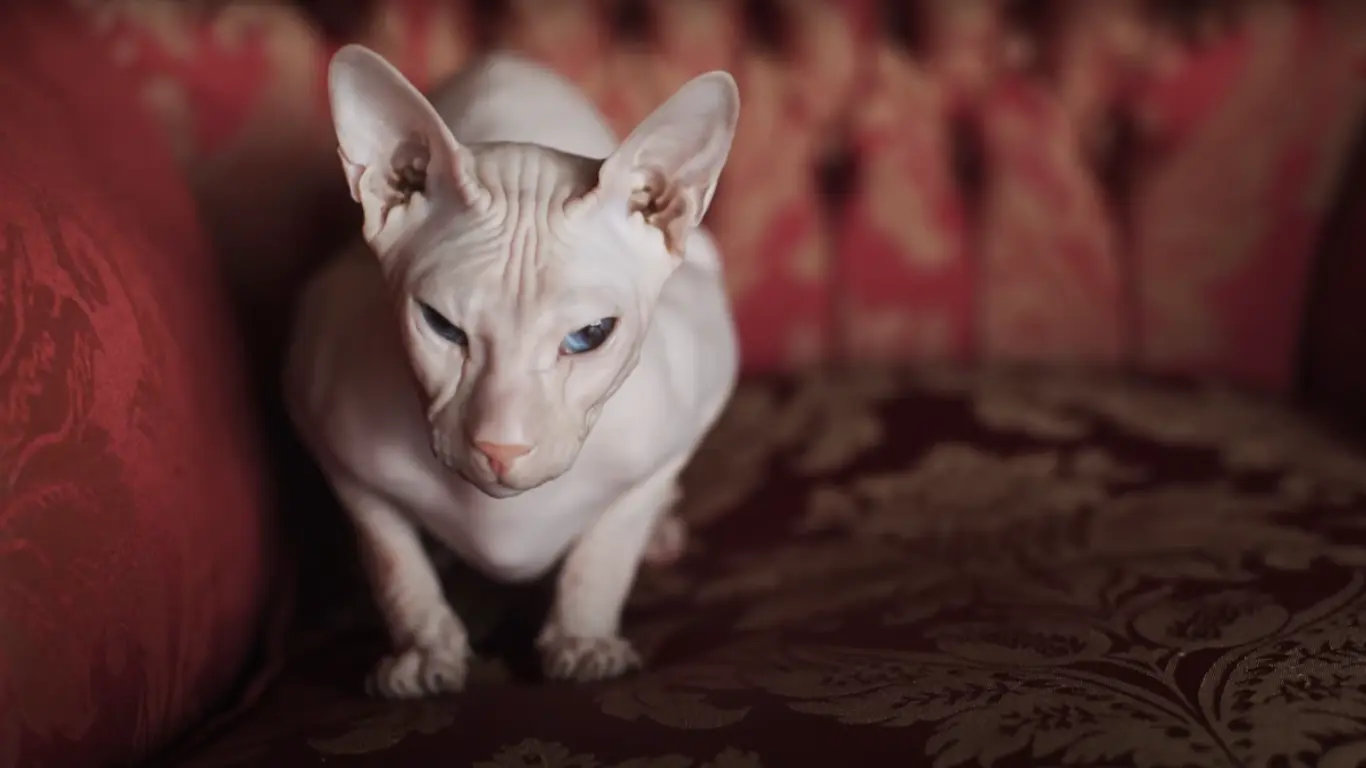
Myth 9: Sphynx Cats Are Expensive to Keep
Another myth is that Sphynx cats are prohibitively expensive to keep due to their unique needs. While there are costs associated with owning a Sphynx, they are not necessarily higher than those for other breeds.
Costs Associated with Owning a Sphynx Cat
The initial cost of acquiring a Sphynx cat can be high, especially from reputable breeders. However, their ongoing care is comparable to that of other cats. Regular vet check-ups, quality food, grooming supplies, and occasional extras like clothing or heated beds can add up, but these are manageable with proper budgeting.
Budgeting Tips for Sphynx Cat Owners
To manage the costs of owning a Sphynx cat, plan your budget carefully. Consider pet insurance to help with unexpected veterinary bills and buy grooming supplies in bulk to save money. Regular vet visits can prevent costly health issues down the road, and investing in high-quality food can reduce the risk of diet-related problems.
Myth 10: Sphynx Cats Are Unnatural or “Man-Made”
Finally, there’s a misconception that Sphynx cats are unnatural or man-made due to their hairlessness. However, this is far from the truth.
The Natural Mutation Behind the Sphynx Breed
The hairlessness of Sphynx cats is due to a natural genetic mutation. This mutation was not artificially induced but occurred spontaneously in the feline population. Over time, breeders recognized the potential of this unique trait and worked to establish the Sphynx breed through careful and ethical breeding practices.
Ethical Considerations in Breeding Sphynx Cats
Responsible breeders adhere to ethical practices, ensuring that Sphynx cats are bred for health and temperament, not just appearance. They conduct health screenings and maintain genetic diversity to avoid the health problems that can arise from inbreeding. This approach helps preserve the breed’s natural traits while ensuring the well-being of the cats.
Wrapping Up: The Truth About Sphynx Cats
Sphynx cats are fascinating, affectionate, and unique companions, but they come with a set of myths that can easily mislead potential owners. By debunking these myths, we hope to provide a clearer picture of what it’s really like to live with a Sphynx cat. These cats are not hypoallergenic, nor are they high-maintenance or inherently unhealthy. They are social, loving pets that, with the right care, can thrive in a variety of homes. If you’re considering adding a Sphynx cat to your family, it’s important to do your research and prepare to meet their specific needs. With proper care and attention, a Sphynx cat can be a rewarding and joyful addition to your life.

